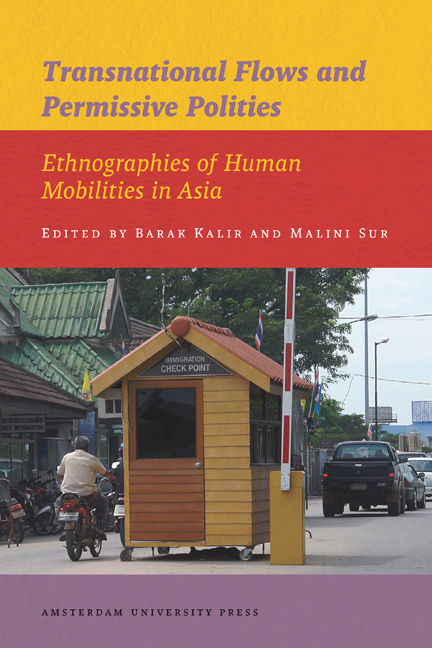Book contents
- Frontmatter
- Contents
- List of Tables, Maps, Figures and Photographs
- Acknowledgements
- Introduction: Mobile Practices and Regimes of Permissiveness
- 1 Illegality Rules: Chinese Migrant Workers Caught up in the Illegal but Licit Operations of Labour Migration Regimes
- 2 Contesting the State of Exception in the Afghan-Pakistani Marchlands
- 3 ‘Looking for a Life’: Rohingya Refugee Migration in the Post-Imperial Age
- 4 Smuggling Cultures in the Indonesia-Singapore Borderlands
- 5 Trade, Transnationalism and Ethnic Infighting: Borders of Authority in Northeast Borneo
- 6 Bamboo Baskets and Barricades: Gendered Landscapes at the India-Bangladesh Border
- 7 Moving between Kerala and Dubai: Women Domestic Workers, State Actors and the Misrecognition of Problems
- 8 Emigration of Female Domestic Workers from Kerala: Gender, State Policy and the Politics of Movement
- 9 Mainland Chinese Migrants in Taiwan, 1895-1945: The Drawbacks of Being Legal
- 10 ‘Playing Edge Ball’: Transnational Migration Brokerage in China
- Epilogue: Irregular Mobilities and Disjunctive Moralities
- About the Editors and Contributors
- Bibliography
- Index
- Publications Series
3 - ‘Looking for a Life’: Rohingya Refugee Migration in the Post-Imperial Age
Published online by Cambridge University Press: 15 January 2021
- Frontmatter
- Contents
- List of Tables, Maps, Figures and Photographs
- Acknowledgements
- Introduction: Mobile Practices and Regimes of Permissiveness
- 1 Illegality Rules: Chinese Migrant Workers Caught up in the Illegal but Licit Operations of Labour Migration Regimes
- 2 Contesting the State of Exception in the Afghan-Pakistani Marchlands
- 3 ‘Looking for a Life’: Rohingya Refugee Migration in the Post-Imperial Age
- 4 Smuggling Cultures in the Indonesia-Singapore Borderlands
- 5 Trade, Transnationalism and Ethnic Infighting: Borders of Authority in Northeast Borneo
- 6 Bamboo Baskets and Barricades: Gendered Landscapes at the India-Bangladesh Border
- 7 Moving between Kerala and Dubai: Women Domestic Workers, State Actors and the Misrecognition of Problems
- 8 Emigration of Female Domestic Workers from Kerala: Gender, State Policy and the Politics of Movement
- 9 Mainland Chinese Migrants in Taiwan, 1895-1945: The Drawbacks of Being Legal
- 10 ‘Playing Edge Ball’: Transnational Migration Brokerage in China
- Epilogue: Irregular Mobilities and Disjunctive Moralities
- About the Editors and Contributors
- Bibliography
- Index
- Publications Series
Summary
Introduction
A refugee, according to Hannah Arendt, was a person who had no right to rights. Her statement was based on her own experience during the Nazi period of being stripped of German citizenship because she was a Jew. This definition of a refugee no longer holds true. In no small measure due to the lessons learned from that experience, a refugee rights regime – flawed and inadequate though it may be – has been established both at the transnational level and, in many Western liberal states, at the national level. This has enabled and legitimised substantial refugee flows and resettlements in the second half of the twentieth century. Less well known, however, are the substantial population displacements and settlements that are illicit and outside of any formal regulatory framework, which have been sustained not by the assertion of civil rights but by the ‘paper citizenship’ of weak states (Sadiq 2008) and the conditional ‘hospitality’ of shared cultural vernaculars.
In this paper, we draw on ethnographic fieldwork and interviews with a refugee group in Malaysia – the Muslim Rohingyas from the province of Arakan in Burma – to make the following arguments. Far from there being a unified and homogenous space of global or transnational migration, represented by the contemporary Western European (and/or US) experience, it would be more appropriate to think of contemporary patterns and practices of border-crossing migration in terms of ‘imagined worlds’ (Appadurai 1990) or ‘overlapping zones’ (Balibar 2003). Bowen (2004) has recently argued for the existence of a discursively constituted ‘transnational Islamic space’. The information gleaned from our interviews with the Rohingya points to the existence of a contemporary transnational Islamic space or zone of migration governed by the practices of illiberal states and shared Muslim hospitality, and of a Muslim migrant world dwelling therein in the interstices of the illegal and the licit.
At the same time, Rohingyas are ‘persons of concern’ to the United National High Commissioner for Refugees (UNHCR) and thus clients of a transnational human rights regime. This regime, anchored in the legal norms of the Western liberal state, with its validation of refugees as a legal category, does confer some degree of state-transcending protection to extra-territorial populations that fall under its care.
- Type
- Chapter
- Information
- Transnational Flows and Permissive PolitiesEthnographies of Human Mobilities in Asia, pp. 75 - 90Publisher: Amsterdam University PressPrint publication year: 2012
- 1
- Cited by

